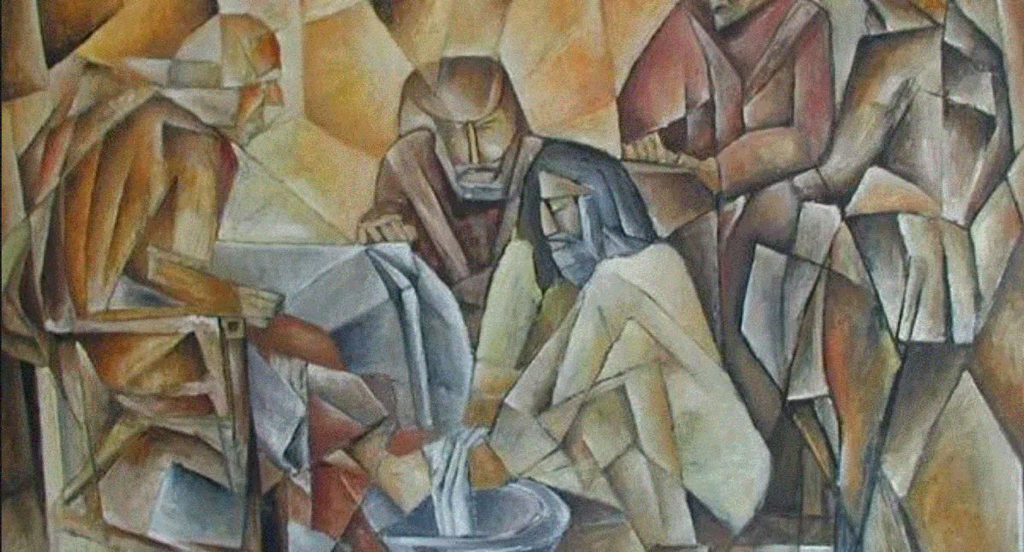- Home
-
Devotions
- Responding to Covid-19 Together
- Pastor's Devotions - May - June 2020 >
-
Pastor's Devotions - March - April 2020
>
- March 24, 2020
- March 25, 2020
- March 26, 2020
- March 27, 2020
- March 28, 2020
- March 30, 2020
- March 31, 2020
- April 1, 2020
- April 2, 2020
- April 3, 2020
- April 4, 2020
- April 6, 2020
- April 7, 2020
- April 8, 2020
- April 9, 2020
- April 15, 2020
- April 16, 2020
- April 17, 2020
- April 21, 2020
- April 22, 2020
- April 23, 2020
- April 24, 2020
- April 28, 2020
- April 29, 2020
- April 30, 2020
- Newsletters
- Calendar
- Worship
- Events
- Tenants
- Giving
Maundy Thursday
April 9, 2020
Lent has ended, Easter is to come and here we stand in the gap. Three holy days: Maundy Thursday, Good Friday, and Holy Saturday, known as the Paschal Triduum, is the bridge that gets us from Lent to Easter.
The season of Lent has done its work. We have come to know our brokenness, our mortality, and our insufficiency. If nothing else, we have come to know that the way of the Lenten life is lacking. There must be something more.
Easter is that something more. It is the gift of hope given. It is hope, through the resurrection, realized. It is the way of life that is abundant, full, and harmonious.
The Paschal Triduum, these three holy days, is the bridge that takes us from Lent to Easter. This is the bridge we will journey over these next three days.
This day, Maundy Thursday, is about love. It is about Jesus’ love for his disciples, the disciples’ acceptance of it, and Jesus’s command to go and love in the same way. We remember the last conversations that Jesus shared with his disciples. We remember the Last Supper, when Jesus broke the bread and took the cup, foreshadowing the trials he was about to endure. We remember when Jesus demonstrated his radical and subversive love by washing the feet of his disciples. We remember the new commandment that Jesus gave to his disciples, to love as he has loved, and that is where we begin.
Little children, I’m with you for a little while longer. You will look for me—but, just as I told the Jewish leaders, I also tell you now—‘Where I’m going, you can’t come.’
“I give you a new commandment: Love each other. Just as I have loved you, so you also must love each other. This is how everyone will know that you are my disciples, when you love each other.”
-John 13:33-35 (CEB)
Maundy comes from the Latin word for “mandate.” We call this day Maundy Thursday because of this passage, when Jesus gives his disciples, and us, a new mandate and it is this: to love as he has loved. Impossible, right? But Jesus wants to make it tangible, realistic for his disciples and so he shows them what this love looks like. And the first step in being able to give love is to accept love.
Jesus and his disciples were sharing the evening meal. The devil had already provoked Judas, Simon Iscariot’s son, to betray Jesus. Jesus knew the Father had given everything into his hands and that he had come from God and was returning to God. So he got up from the table and took off his robes. Picking up a linen towel, he tied it around his waist. Then he poured water into a washbasin and began to wash the disciples’ feet, drying them with the towel he was wearing. When Jesus came to Simon Peter, Peter said to him, “Lord, are you going to wash my feet?”
Jesus replied, “You don’t understand what I’m doing now, but you will understand later.”
“No!” Peter said. “You will never wash my feet!”
Jesus replied, “Unless I wash you, you won’t have a place with me.”
Simon Peter said, “Lord, not only my feet but also my hands and my head!”
Jesus responded, “Those who have bathed need only to have their feet washed, because they are completely clean. You disciples are clean, but not every one of you.” He knew who would betray him. That’s why he said, “Not every one of you is clean.”
After he washed the disciples’ feet, he put on his robes and returned to his place at the table. He said to them, “Do you know what I’ve done for you? You call me ‘Teacher’ and ‘Lord,’ and you speak correctly, because I am. If I, your Lord and teacher, have washed your feet, you too must wash each other’s feet. I have given you an example: just as I have done, you also must do. I assure you, servants aren’t greater than their master, nor are those who are sent greater than the one who sent them. Since you know these things, you will be happy if you do them.
-John 13:2-17 (CEB)
This is how love shows itself, not in arrogance but in humility. In the bending down and the taking of that which is most humble of another person and making it beautiful and clean again.
Our initial response to true love is usually to decline it. Like Peter, we cry out, “You will never wash my feet.” We are self-sufficient and we have no need that we cannot satisfy.
But, Lent has left us bankrupt and we have seen how shortly we truly fall. In this place of weakness, of inability, of insufficiency, allowing Jesus’s love to come to us is often the most difficult thing we can do. In this moment, we must simply accept love. To accept love…will we allow ourselves to do that?
That evening he took his place at the table with the twelve disciples. As they were eating he said, “I assure you that one of you will betray me.”
Deeply saddened, each one said to him, “I’m not the one, am I, Lord?”
He replied, “The one who will betray me is the one who dips his hand with me into this bowl. The Human One goes to his death just as it is written about him. But how terrible it is for that person who betrays the Human One! It would have been better for him if he had never been born.”
Now Judas, who would betray him, replied, “It’s not me, is it, Rabbi?”
Jesus answered, “You said it.”
While they were eating, Jesus took bread, blessed it, broke it, and gave it to the disciples and said, “Take and eat. This is my body.” He took a cup, gave thanks, and gave it to them, saying, “Drink from this, all of you. This is my blood of the covenant, which is poured out for many so that their sins may be forgiven. I tell you, I won’t drink wine again until that day when I drink it in a new way with you in my Father’s kingdom.”
-Matthew 26:20-29 (CEB)
The Lord Jesus, the same night in which he was betrayed…the same night in which he was betrayed…gave himself, for love.
The love of Jesus is utterly unaccountable— except that Jesus is God and God is love. It certainly has no cause in us. It reacts to or repays or rewards nothing in us. It is beyond human measure, beyond human comprehension. The love of God simply is, regardless of us. Love like this takes our breath away.
For when did Jesus choose to give us the enduring gift of his presence, his dear communing with us? When we were worthy of the gift? When we were good enough? Hardly. It was precisely when we were most unworthy. When our nastiness was directed particularly at him.
The Lord Jesus, the same night in which he was betrayed, took bread. In the night when his people betrayed him, the Lord Jesus said, “This is my blood of the covenant, poured out for many.” That moment. It was then!
Betrayal and love. Can we comprehend the joining of two such extremes, the good of God and the evil of humanity together? In the night of the gravest human treachery, Jesus gave the gift of himself. And the giving has never ceased. The holy communion continues today. This is grace. This is love.
The bread, his body broken. The cup, his blood poured out.
Prayer of Response
Jesus, you came to dwell among us, to live as a part of your creation. You humbled yourself from the divine to the human. You came to show us love.
Jesus, we accept your love.
As you broke the bread and poured out the cup, we remember your sacrifice. When we take the bread and drink of the cup, we proclaim your death until you return.
Jesus, we accept your love.
You, lord over all creation, humbled yourself and washed the feet of your disciples. To show that your love knows no bounds, you became a servant to all.
Jesus, we accept your love.
In these ways, we recognize your love. We are grateful for your love. We are humbled by your love.
Jesus, we want to love as you have loved. Empower us with your love.
Amen.
The season of Lent has done its work. We have come to know our brokenness, our mortality, and our insufficiency. If nothing else, we have come to know that the way of the Lenten life is lacking. There must be something more.
Easter is that something more. It is the gift of hope given. It is hope, through the resurrection, realized. It is the way of life that is abundant, full, and harmonious.
The Paschal Triduum, these three holy days, is the bridge that takes us from Lent to Easter. This is the bridge we will journey over these next three days.
This day, Maundy Thursday, is about love. It is about Jesus’ love for his disciples, the disciples’ acceptance of it, and Jesus’s command to go and love in the same way. We remember the last conversations that Jesus shared with his disciples. We remember the Last Supper, when Jesus broke the bread and took the cup, foreshadowing the trials he was about to endure. We remember when Jesus demonstrated his radical and subversive love by washing the feet of his disciples. We remember the new commandment that Jesus gave to his disciples, to love as he has loved, and that is where we begin.
Little children, I’m with you for a little while longer. You will look for me—but, just as I told the Jewish leaders, I also tell you now—‘Where I’m going, you can’t come.’
“I give you a new commandment: Love each other. Just as I have loved you, so you also must love each other. This is how everyone will know that you are my disciples, when you love each other.”
-John 13:33-35 (CEB)
Maundy comes from the Latin word for “mandate.” We call this day Maundy Thursday because of this passage, when Jesus gives his disciples, and us, a new mandate and it is this: to love as he has loved. Impossible, right? But Jesus wants to make it tangible, realistic for his disciples and so he shows them what this love looks like. And the first step in being able to give love is to accept love.
Jesus and his disciples were sharing the evening meal. The devil had already provoked Judas, Simon Iscariot’s son, to betray Jesus. Jesus knew the Father had given everything into his hands and that he had come from God and was returning to God. So he got up from the table and took off his robes. Picking up a linen towel, he tied it around his waist. Then he poured water into a washbasin and began to wash the disciples’ feet, drying them with the towel he was wearing. When Jesus came to Simon Peter, Peter said to him, “Lord, are you going to wash my feet?”
Jesus replied, “You don’t understand what I’m doing now, but you will understand later.”
“No!” Peter said. “You will never wash my feet!”
Jesus replied, “Unless I wash you, you won’t have a place with me.”
Simon Peter said, “Lord, not only my feet but also my hands and my head!”
Jesus responded, “Those who have bathed need only to have their feet washed, because they are completely clean. You disciples are clean, but not every one of you.” He knew who would betray him. That’s why he said, “Not every one of you is clean.”
After he washed the disciples’ feet, he put on his robes and returned to his place at the table. He said to them, “Do you know what I’ve done for you? You call me ‘Teacher’ and ‘Lord,’ and you speak correctly, because I am. If I, your Lord and teacher, have washed your feet, you too must wash each other’s feet. I have given you an example: just as I have done, you also must do. I assure you, servants aren’t greater than their master, nor are those who are sent greater than the one who sent them. Since you know these things, you will be happy if you do them.
-John 13:2-17 (CEB)
This is how love shows itself, not in arrogance but in humility. In the bending down and the taking of that which is most humble of another person and making it beautiful and clean again.
Our initial response to true love is usually to decline it. Like Peter, we cry out, “You will never wash my feet.” We are self-sufficient and we have no need that we cannot satisfy.
But, Lent has left us bankrupt and we have seen how shortly we truly fall. In this place of weakness, of inability, of insufficiency, allowing Jesus’s love to come to us is often the most difficult thing we can do. In this moment, we must simply accept love. To accept love…will we allow ourselves to do that?
That evening he took his place at the table with the twelve disciples. As they were eating he said, “I assure you that one of you will betray me.”
Deeply saddened, each one said to him, “I’m not the one, am I, Lord?”
He replied, “The one who will betray me is the one who dips his hand with me into this bowl. The Human One goes to his death just as it is written about him. But how terrible it is for that person who betrays the Human One! It would have been better for him if he had never been born.”
Now Judas, who would betray him, replied, “It’s not me, is it, Rabbi?”
Jesus answered, “You said it.”
While they were eating, Jesus took bread, blessed it, broke it, and gave it to the disciples and said, “Take and eat. This is my body.” He took a cup, gave thanks, and gave it to them, saying, “Drink from this, all of you. This is my blood of the covenant, which is poured out for many so that their sins may be forgiven. I tell you, I won’t drink wine again until that day when I drink it in a new way with you in my Father’s kingdom.”
-Matthew 26:20-29 (CEB)
The Lord Jesus, the same night in which he was betrayed…the same night in which he was betrayed…gave himself, for love.
The love of Jesus is utterly unaccountable— except that Jesus is God and God is love. It certainly has no cause in us. It reacts to or repays or rewards nothing in us. It is beyond human measure, beyond human comprehension. The love of God simply is, regardless of us. Love like this takes our breath away.
For when did Jesus choose to give us the enduring gift of his presence, his dear communing with us? When we were worthy of the gift? When we were good enough? Hardly. It was precisely when we were most unworthy. When our nastiness was directed particularly at him.
The Lord Jesus, the same night in which he was betrayed, took bread. In the night when his people betrayed him, the Lord Jesus said, “This is my blood of the covenant, poured out for many.” That moment. It was then!
Betrayal and love. Can we comprehend the joining of two such extremes, the good of God and the evil of humanity together? In the night of the gravest human treachery, Jesus gave the gift of himself. And the giving has never ceased. The holy communion continues today. This is grace. This is love.
The bread, his body broken. The cup, his blood poured out.
Prayer of Response
Jesus, you came to dwell among us, to live as a part of your creation. You humbled yourself from the divine to the human. You came to show us love.
Jesus, we accept your love.
As you broke the bread and poured out the cup, we remember your sacrifice. When we take the bread and drink of the cup, we proclaim your death until you return.
Jesus, we accept your love.
You, lord over all creation, humbled yourself and washed the feet of your disciples. To show that your love knows no bounds, you became a servant to all.
Jesus, we accept your love.
In these ways, we recognize your love. We are grateful for your love. We are humbled by your love.
Jesus, we want to love as you have loved. Empower us with your love.
Amen.


